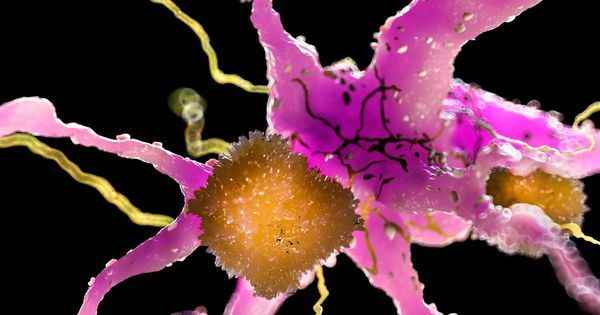Posted on 11/17/2021
2 min read
British and German researchers have identified an antibody capable of neutralizing a certain form of the beta-amyloid protein, which is involved in the development of Alzheimer’s disease. As a treatment and vaccine, it has relieved symptoms in mice.
Affecting 900,000 people in France, the Alzheimer’s disease is linked, among other phenomena, to the accumulation of a protein called beta-amyloid in the brain, which creates lesions. If research focuses on this protein to achieve a curative treatment, a new study published on November 15, 2021 in the journal Nature Molecular Psychiatry focused on a different form of protein, called soluble.
TAP01_04 antibody and TAPAS vaccine
In Alzheimer’s disease, a large amount of beta-amyloid protein becomes truncated, and some scientists believe that this form is a key factor in the development and progression of the pathology. “In clinical trials, none of the potential treatments that dissolve amyloid plaques in the brain have been successful in reducing Alzheimer’s symptoms. Some have even resulted in negative side effects. We have tried a different approach. We have identified an antibody in mice that neutralizes truncated forms of soluble beta-amyloid, but which does not bind to normal forms of the protein or to plaques.”, Explains Professor Thomas Bayer, co-author of the study, in a statement.
The antibody, called TAP01_04, has been adapted so that it cannot be recognized as a foreign body in humans. Scientists were able to see that the beta-amyloid protein folds on itself. “This structure had never been seen before in beta-amyloids., says Professor Mark Carr, another co-author of the study. However, the discovery of this so defined structure allowed the team to model this region of the protein to stabilize the hairpin shape and therefore bind to the antibody in the same way. Our idea was that this form of beta-amyloid could potentially be used as a vaccine, to trigger a person’s immune response to make TAP01_04 type antibodies.”
When researchers tested this form of beta-amyloid in mice, they could see that rodents that received this vaccine, called TAPAS, had indeed produced TAP01 type antibodies. Subsequently, the ‘humanized’ antibody and the vaccine were tested on two different mouse models with Alzheimer’s disease: in both cases, they helped restore neuronal function, increase glucose metabolism in brain, restore memory loss and reduce the formation of amyloid plaques.
“Promising” treatments
“The humanized TAP01 _04 antibody and TAPAS vaccine are very different from other antibodies and vaccines already tested for Alzheimer’s disease in clinical trials, because they target a different form of the protein.”, Summarizes Dr. Preeti Bakrania, who also participated in the study. “This opens up the possibility of not only treating Alzheimer’s disease once symptoms are detected, but also potentially vaccinating against this disease before symptoms appear.”, Adds Prof. Carr. Treatments “promising” who could “transforming the lives of many patients”If the results were to be confirmed in humans.
.
dts1
